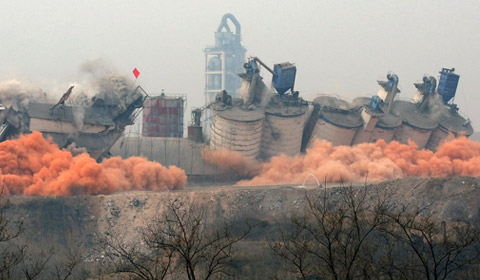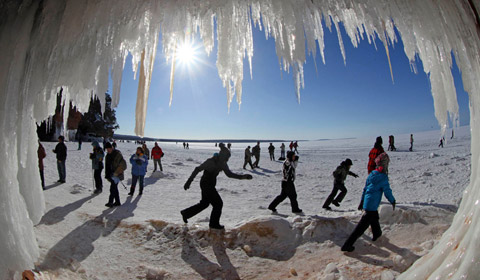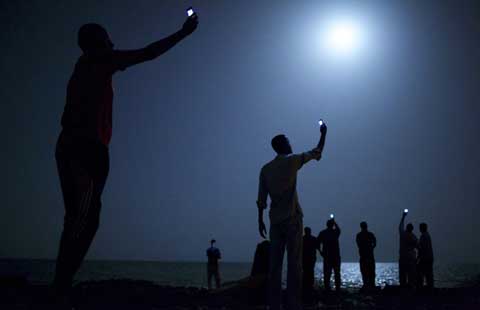Beijing calls on Tokyo to return plutonium to US
Updated: 2014-02-18 01:38
By ZHANG YUNBI (China Daily)
|
||||||||
China voiced "serious concern" on Monday over Japan’s possession of weapons-grade nuclear materials, urging Tokyo to return the plutonium borrowed from the United States as soon as possible.
Critics around the world have publicly questioned Japan’s nuclear strategy after Japan’s Kyodo News Agency confirmed that Washington has been pressing Tokyo since 2010 to return more than 300 kilograms of mostly weapons-grade plutonium.
Government sources in the US and Japan said the plutonium — given to Japan for research purposes during the Cold War era — could be used to produce 40 to 50 nuclear weapons, and since then Japan had strongly resisted returning the material.
"We believe that Japan, as a party to the Treaty on the Non-Proliferation of Nuclear Weapons, should strictly observe its international obligations of nuclear nonproliferation and nuclear security," Foreign Ministry spokeswoman Hua Chunying said on Monday.
According to Kyodo, Washington planned to forge an accord with Tokyo in March, on the occasion of the third nuclear security summit in the Netherlands, concerning the return of the 331 kg of plutonium now stored at the Japan Atomic Energy Agency.
"Over quite a long period of time, Japan has not returned the weapons-grade nuclear material it has stored to the relevant country, and this has led to concerns within the international community. The Chinese side is also greatly concerned, and hopes Tokyo will explain this matter," Hua said.
Although Washington expects its ally Japan to shoulder more security duties in East Asia, "allowing Japan to become a country with nuclear weapons" is not an option for the US, said Wu Huaizhong, director of the department of Japanese politics at the Institute of Japanese Studies at the Chinese Academy of Social Sciences.
"These days, there are only two red lines Tokyo is not allowed to cross; first, no possession of nuclear weapons; second, drifting away from the alliance with the US and aligning itself with Asian neighbors," Wu said.
Japan’s growing plutonium stockpiles have worried nuclear technology experts worldwide.
Japan’s massive Rokkasho nuclear facility for separating plutonium in spent nuclear fuel may "serve as a tempting target for terrorists and a means of undermining nonproliferation objectives in Northeast Asia", Masako Toki, an expert of Nonproliferation Studies at Monterey Institute of International Studies, California, and Miles Pomper, former editor of the journal Arms Control Today, warned in a recent article.
Early in 2012, the Associated Press said in a report that "Japan still intends to reprocess spent fuel at Rokkasho. It sees few other options, even though it will mean extracting plutonium that could be used to make nuclear weapons."
Hua said the Japan’s stock of nuclear materials raises issues regarding the risk of proliferation and the balance between supply and demand.
"We also urge Japan to take tangible measures and inform the international community of its plan to resolve the imbalance of supply and demand within the country as required by the International Atomic Energy Agency," Hua said.

 17 more cement plants biting the dust
17 more cement plants biting the dust
 World's largest freshwater lake frozen
World's largest freshwater lake frozen
 American photographer wins World Press Photo 2013
American photographer wins World Press Photo 2013
 Zhou Yang retains women's 1500m title
Zhou Yang retains women's 1500m title
 Renzi set to become Italy's youngest PM
Renzi set to become Italy's youngest PM
 Kissing contest celebrates Valentine's Day in Beijing
Kissing contest celebrates Valentine's Day in Beijing
 Xinjiang quake damage could have been worse
Xinjiang quake damage could have been worse
 US East Coast buried in snow
US East Coast buried in snow
Most Viewed
Editor's Picks

|

|

|

|

|

|
Today's Top News
Beijing calls on Tokyo to return plutonium to US
Xi calls on leaders to carry out new reforms
Cross-Straits talks possible
Trade inquiry creates friction
Bigger Chinese role in the Arctic
US anti-dumping inquiry creates friction: Ministry
Speculation stirs over Xi-Ma talks
Bigger Chinese role in the Arctic
US Weekly

|

|





